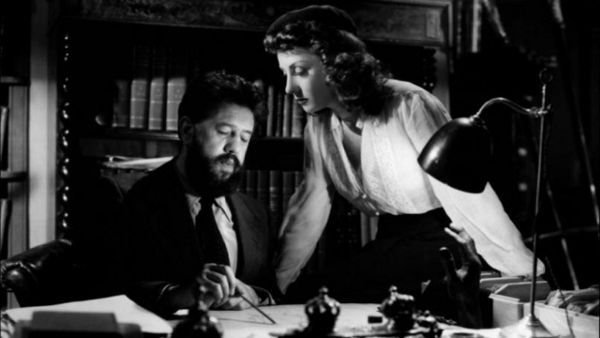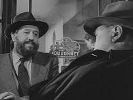Eye For Film >> Movies >> Panique (1946) Film Review
Panique
Reviewed by: Jennie Kermode

Many readers here will be acquainted with Patrice Leconte's acclaimed 1989 film Monsieur Hire. This 1946 film is the original version of that story, and has a great deal to recommend it, yet is low on the radar today. Time has not been kind to it and both the print and the audio are in pretty rough condition, but it remains a powerful piece of cinema sustained by some great performances.
Chef among these is that of Michel Simon as Monsieur Hire, the quiet, eccentric yet gentle man who is identified as chief suspect by a frightened community after a woman is murdered. He's an outcast from the start but perhaps unaware of it, like so many intellectuals at the start of the war. In the heart of the city is a fairground and in an early scene we see him go on the dodgems. His is the only car not occupied by a couple. At first this attracts light laughter from a few of the others, who bump him playfully; he bumps back, not seeing anything amiss. Within minutes, everyone is bumping him, and the mood has changed. It's a warning sign. There will be worse, much worse, to come.

The subject of mob vigilantism had been explored before the war in films like Fritz Lang's M; afterwards it took on a different tone. Europe was trying to understand what had happened; ordinary citizens were asking themselves what they had allowed, what they had done. It's no accident that Monsieur Hire is a Jew. He's hunted as Jews had been hunted for centuries before the Nazis arrived; there's a sharp contrast with other films of the period in which Nazis or collaborators were the targets of mob vengeance. Duvivier draws on the bitterness and anger in contemporary audiences and reminds them that the target of such primal emotions can be anyone.
With a sharp eye for action, Duvivier creates a film full of stops and starts, full of movement that seems out of control but coheres in particular directions, leading to a final frantic rooftop chase. In the meantime there are slower scenes that gradually accumulate menace, especially as we see the local people gossiping in streets and shops, harmless trivialities gradually replaced by something darker. Then there's Alice (Viviane Romance), the local girl whom Monsieur Hire has watched and adored for an age, flirting with him to please her vicious lover, setting him up. Despite this cruelty, as the only person who gets to know him, she's also the person who comes to feel sympathy for him, and as such she becomes a pivotal figure in the story, the conscience of the mob.
There are no big surprises in the story here; indeed, inevitability, or the belief therein, is one of Duvivier's concerns. In a Europe where everybody was beginning to say that we must never let it happen again, he dared to tell his viewers that nothing had really changed.
Reviewed on: 08 Feb 2016















